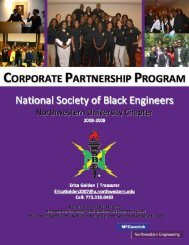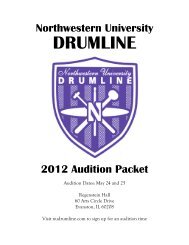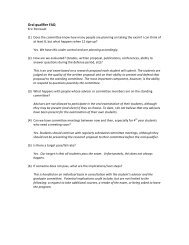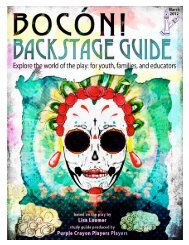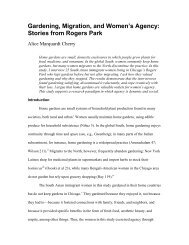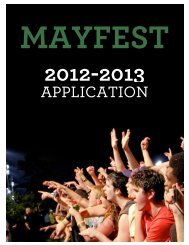research - Associated Student Government, Northwestern University
research - Associated Student Government, Northwestern University
research - Associated Student Government, Northwestern University
Create successful ePaper yourself
Turn your PDF publications into a flip-book with our unique Google optimized e-Paper software.
RESEARCHby educational institutions, employers, or even by thepenal code. Therefore, this <strong>research</strong> will focus on voluntaryservice, specifically the significance of civil society.Historically religious institutions have aimed to broadenthe reach of civil society, in lieu of American capitalism.Cohen and Arato help clarify the role of civil society inregards to economic society:In principle, similar consideration pertain to the relationshipbetween civil and economic society, even if historically,under capitalism, economic society has been moresuccessfully insulated from the influence of civil societythan political society has been, despite the claims of elitetheories of democracy. (Cohen and Arato, 29, 1992)The United States touts a political economy that, forthe most part, follows the equilibrium of the market.Without welfare contributions from civil society, theAmerican public at large would destabilize. However,many citizens devote large amounts of time and energyto specific causes or populations, which helps stabilizesociety. With this knowledge it should come as no surprisethat there are emerging interdisciplinary fields ofsociology, political science, and anthropology, which aretrying to discern the key factors that shape the motivesof these citizens.B. Critical PedagogyThese types of unconventional educational theories“were inspired by Paulo Freire’s community literacyprograms” (Whelan, 2, 2002), and education, coalitionbuilding, and advocacy are intimately connected in thisframework. Whelan claims popular education or servicelearning needs to be more broadly incorporated into theacademic educational process and that:This shift will involve redefining ‘education’. Educationneed not be confined to awareness raising activities, marketinggimmicks or to institutionalized programs. Populareducation implies personally and politically relevant content,alignment with the ideals of social movements and aninterest in collective action. (Whelan, 8, 2002)Paulo Freire, a critical pedagogist, is best known forhis critique of the banking concept of education. Traditionalistsview students as empty vessels to be filled bythe knowledge mediated by a teacher. Freire notes thatthis process “transforms students into receiving objects.It attempts to control thinking and action, leads menand women to adjust to the world, and inhibits theircreative power.” (Freire, 77, 1970) For Freire, this inhibitionof creative powers creates an apathetic population,which can be easily manipulated by politics.No pedagogy which is truly liberating can remain distantfrom the oppressed by treating them as unfortunates andby presenting for their emulation models from among theoppressors. The oppressed must be their own example inthe struggle for their redemption. (Freire, 54, 1970)Nowadays, scholarship concerning service aims totease out the complicated motives when dealing withvoluntary service. If we can better understand the motivatingfactors of students, institutions might be able tobypass these anarchic educational frameworks.The importance of voluntary service can clearlybe seen in its ability to educate youth in collaborationfor a public interest. Many avenues exist for voluntaryservice, whether it is health, poverty, or in this case theenvironment. Why some choose a particular type ofservice, is contingent on a host of variables and motives.However, that is not the goal of this <strong>research</strong>; insteadwe hope to explain compare the motives of our samplepopulations once they have committed to a realm ofservice. This consists of a broad range of variables thatcan be held constant across our data set, and finally helparticulate the underlying motives of voluntary environmentalservice.C. Motivating FactorsOne national survey, administered by the state governmenthealth and human service managers, exploredthe role that organizational factors play in shapingpublic service motivation (PSM). It found that PSM isstrongly and positively related to the level of educationand membership in professional organizations, additionally,sociohistorical context is a primary influence.The definition taken here of PSM is that “an individual’spredisposition to respond to motives is grounded primarilyor uniquely in public institutions and organizations.”(Perry, 471, 2000) Institutions that affect PSMare primarily parental relations, religion, observationallearning and modeling during the course of their lives,education and professional training.Due to the intimate relationship between PSM andeducation, many academic institutions have aimed toenhance greater access and resources to service learningand VES organizations in general. The Edwards andMooney study examined the apparent increase in popularityin service learning on a broad scope. They toofaced issues of accurately defining service in addition toservice learning due to the many avenues of opportunitiesto give back to various communities. The study waslocated in an academic institution, and service learningwas defined as “an evolving pedagogy that incorporatesstudent volunteering into the dynamics of experientiallearning and structure of an academic curriculum.”(Edwards and Mooney, 184, 2001) The goals for servicelearning are to critically reflect on recent service, todistill and synthesize current thinking in addition to illustratingthe educational differences between learningmethodologies and curricular benefits associated withdifferent options. Examinations were made in regards toout-of-class activities, volunteering, service add-ons, internships(or practica), service learning or service learningadvocacy. This form of critical pedagogy conductedacross student campuses is an integral component ofVES.D. Civic Participation and the EnvironmentBefore we can treat voluntary environmental service64 NORTHWESTERN UNDERGRADUATE RESEARCH JOURNAL



